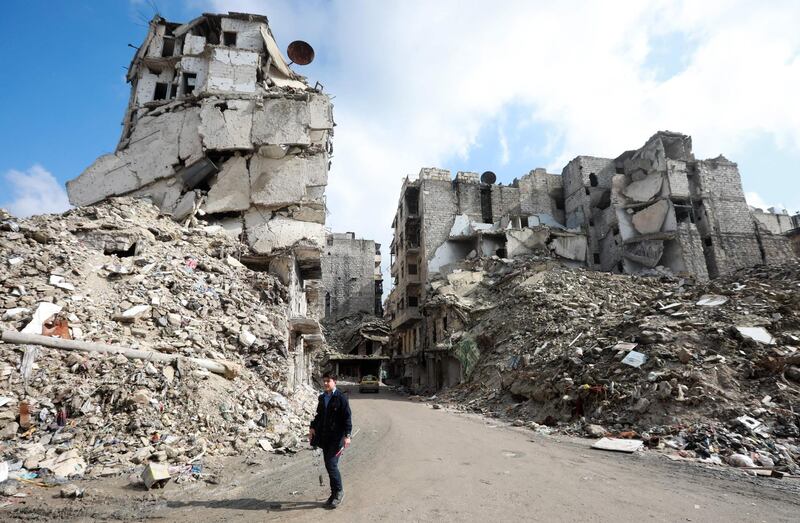Concerns about funding reconstruction in Syria under Bashar Al Assad have been heightened by a new report that details how his regime uses international assistance to pursue repressive policies against the population.
International organisations working in the country risk becoming complicit in human rights violations, the report by Human Rights Watch says.
“The Syrian government has developed a policy and legal framework that allows it to divert aid and reconstruction resources to fund its atrocities, punish those perceived as opponents, and benefit those loyal to it,” the international rights group said in a statement released along with the report on Friday.
The report, titled “Rigging the system: government policies co-opt aid and reconstruction funding in Syria”, was based on interviews with aid workers, donors, experts, and beneficiaries, as well as a review of publicly available data on humanitarian and development assistance and reconstruction, it said.
After eight years of war, more than a third of Syria’s infrastructure has been destroyed, mostly by the Syrian-Russian military alliance, according to the World Bank, which estimates that the reconstruction effort will cost nearly $400 billion (Dh1.47 trillion).
Russia, Mr Al Assad's main international backer along with Iran, has been calling for Europe and the United States to fund the reconstruction, but they refuse as long as the Syrian government does not implement reforms such as a political transition.
However, President Al Assad has made clear he intends to stay in power and recently started normalising relations with Arab countries through the reopening of embassies and of border crossings.
HRW identified at least 60 firms that had expressed an interest in participating in reconstruction in Syria as of December 2018. Most of them were Iranian, but there were Lebanese, Russian, German, French and Belgian companies as well.
Based on the Syrian government's track record, HRW argues that an increased presence of humanitarian organisations and private companies risks strengthening the state’s abusive apparatus.
To operate in Syria, humanitarian organisations must submit projects to the government for approval. Several of these organisations told HRW that they are often rejected on “vague and even arbitrary grounds”.
If the project is accepted, organisations must work with pre-approved local partners which co-operate with Syrian security services and can give them access to their beneficiary lists and programming at any point, humanitarian workers told HRW.
Such meddling puts beneficiaries at risk of abuse, as Syrian intelligences branches are known to have tortured and summarily executed political opponents in the past.
One aid worker told HRW that local staff of the Syrian Arab Red Crescent (SARC) stole and resold humanitarian supplies with the help of Syrian intelligence.
The SARC, a large humanitarian organisation closely affiliated with the government, operates with several UN agencies and international NGOs such as the Danish Refugee Council and the Red Cross.
In addition to this, aid organisations are routinely denied field visits and have little oversight over their local partner’s work, which opens the door to corrupt practices.
According to HRW, one UN agency that partnered with a local actor founded by a member of the National Defence Forces, a large pro-government militia, found out six months later that their project had not been implemented despite the funds being handed over.
Syrian authorities also regularly propose their own projects without giving organisations full access to the area to ascertain its need. Some areas are “rewarded” for their support of the regime, while others, previously held by anti-government groups, are “punished” by being given less aid.
Should humanitarian organisations refuse to operate in these conditions, the Syrian government uses the withholding or denial of visas for the international staff as leverage.
To address these risks, HRW recommends the creation of a funding consortium for humanitarian and reconstruction programmes that is open only to organisations that adopt specific criteria such as insisting on full access to all areas and maintaining beneficiaries’ confidentiality.
Private businesses must conduct due diligence before investing Syria to avoid partnering with an entity under sanctions or known to commit human rights abuses, HRW said.
Key stakeholders in reconstruction projects such as Syrian businessman Samer Foz were blacklisted by the EU and the US this year. He was accused of war-profiteering and of building on land stolen from people who had fled the fighting.
Companies that are implicated in gross human rights abuses can be subject to criminal or civil liability under several jurisdictions, HRW warned.
Although no business has yet been prosecuted for operating with groups or institutions backed by the Syrian regime, a French cement company was recently indicted for complicity in crimes against humanity in Syria, potentially paving the way for similar cases.
To continue operating despite the war, Lafarge paid nearly €13 million (Dh54m) to armed groups including ISIS in 2013 and 2014.
As part of the investigation, France seized part of the severance payment to the former co-chairman of the company last October.





